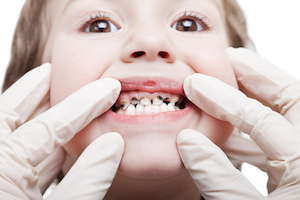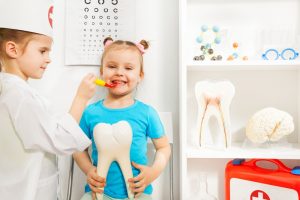
The good news? It can be prevented. Read on to find out how you can get your child off to the best start for their oral health.
Causes of rotten baby teeth
Cavities in baby teeth can be caused by a variety of reasons, some of which can be very surprising to unknowing parents.
Certain factors can make a child more susceptible to rotten baby teeth, such as race and ethnicity. This can be discussed and managed with your dentist.
Rotten baby teeth can often be attributed to the following practices:
- Feeding practices – A child that takes a bottle to bed, or uses the bottle for comfort sucking, is at risk of tooth decay.
- Transfer from caregiver – The bacteria found in the mouth of a baby’s caregiver can be transferred to baby, with the bacteria turning sugar into acid, resulting in cavities.
- Diet – Sugar found in foods as well as drinks can cause rotten baby teeth and should be used in moderation.
- Poor oral hygiene – A lack of fluoride, and inadequate brushing are largely attributed to tooth decay.
Prevention and treatment of Early Childhood Caries
Taking your child to the dentist is recommended after birth, and within the first year. The sooner a problem is anticipated, the better it can be treated.
Additionally, there are a number of important steps you can take at home to help prevent your child from developing cavities in their baby teeth.
- Feeding practices – Avoid putting any liquid in your child’s bottle other than milk or water. Ensure the child finishes their milk before being put to bed, and doesn’t suckle on the bottle for prolonged periods. Never put anything on your baby’s dummy, this includes honey.
- Transfer from caregiver – Try to avoid the transfer of saliva from yourself to your baby. This can occur through kissing, sharing spoons, and cleaning the baby’s dummy in your own mouth.
- Diet – Limit sugars in your child’s diet. High fructose foods can be found in fruit, and lactose is a sugar found in milk. More obvious sugars are the sucrose found in processed foods such as cakes, biscuits, lollies, chocolate, soft drink and jam.
- Oral Hygiene – Teeth should be gently brushed with a smear of child’s toothpaste (containing fluoride) as soon as they appear. Supervision with tooth brushing needs to be provided until the child is capable of thoroughly cleaning and spitting on their own, usually until at least age 6. While difficult, flossing is essential, particularly of the back molar teeth.
A significant reduction in tooth decay is found in patients using a fluoride toothpaste twice daily.
If your child does develop rotten baby teeth, your dentist will advise you on the course of action required.
Treatment depends on the extent of damage, and the age of your child. Young children, especially those under age 3, would not generally get filling work done and in the case of multiple cavities would be given a general anaesthetic.
If you have concerns of course the first stop should always be your paediatric dentist.













